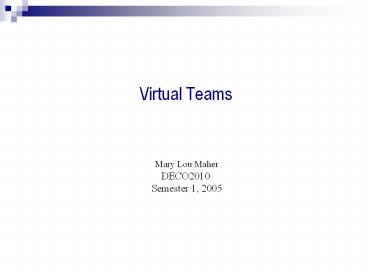Virtual Teams - PowerPoint PPT Presentation
1 / 19
Title:
Virtual Teams
Description:
Virtual Teams ... personalities: sex, culture, age. technical skills, experience, ... Virtual Team Skills. Project Management Skills. Teamwork Core Skills ... – PowerPoint PPT presentation
Number of Views:102
Avg rating:3.0/5.0
Title: Virtual Teams
1
Virtual Teams
Mary Lou Maher DECO2010 Semester 1, 2005
2
What is a Team?
- A TEAM is a group of individuals who share norms,
beliefs and objectives which bring them together - A TEAM acts together to achieve a shared purpose
and - A TEAM is a group of individuals whose tasks are
dependent on the work of others.
3
Characteristics of a Team
- common goal - objectives
- size, number of people
- personalities sex, culture, age
- technical skills,
- experience, worked before
- tools they have resources
- Beliefs, values
- Communication, collaboration technology
4
Team Tasks
- generate ideas, creativity tasks, generate plans
- choose a preferred solution
- negotiate conflicting views
- execute in competition with an opponent
5
Design Teams
- Project and development team
- May consist of diverse, specialized experts
- May come together to produce a one-time output, a
design - Whenever their work is complete , the project
team disbands and the return to their units, or
move other project teams - Temporary structure
- Relationships are short-lived, and interactions
are temporary
6
Team working relationships
- Some teams experience a bitter and frustrating
working relationship with members that they
thought were bright and talented. - Some others experience the most productive and
successful working relationship that they have
ever had with a colleague or a client. - Why is this?
7
Collaboration
- A process through which parties see different
aspects of a problem - Constructively explore their differences and
search for solutions that go beyond their own
limited version of what is possible. - Compromise is not needed
- Team members recognize and respect each other
pool diversity rather than compromise differences
8
- When conflict is good
- Lead to new ideas
- Lead to new approaches to organizational process
- Increased interest in dealing with problems
- Facilitates the surfacing of important issues
- Opportunities for people to develop their
communication and interpersonal skills.
9
When conflict is good
- Lead to new ideas
- Lead to new approaches to organizational process
- Increased interest in dealing with problems
- Facilitates the surfacing of important issues
- Opportunities for people to develop their
communication and interpersonal skills.
10
Handling Negative Conflict
- Five accepted techniques (Nelson, 1995)
- Direct Approach leader confront the issue
- Bargaining Third party resolve conflict
compromise on both sides both walking equally
dissatisfied. - Enforcement of Team Rules Avoid it. Hard
feelings towards leader and team. Leave team. - Retreat Problem is not real. Avoid it or
working around it. - De-emphasis form of bargaining where the
emphasis is on the areas of agreement.
11
- Virtual teams
- transcend distance, time zone and organizational
boundaries
12
Virtual Teams
- transcend distance,
- time zone, and
- organizational boundaries
13
Skills Classification Profiling 1
Design Activities Teamwork Core Skills Project Management Skills Virtual Team Skills
Orientating Adaptability Leadership Trust
Subdividing the problem Shared situational awareness Communication Culture
Establishing roles Performance monitoring and feedback Conflict resolution Archiving
Information seeking Leadership / team management Negotiation
14
Generic Skills for Virtual Teams
Design Activities Teamwork Core Skills Project Management Skills Virtual Team Skills
Orientating Adaptability Leadership Trust
Subdividing the problem Shared situational awareness Communication Culture
Establishing roles Performance monitoring and feedback Conflict resolution Archiving
Information seeking Leadership / team management Negotiation
15
Skills Classification Profiling 2
Design Activities (cont) Teamwork Core Skills (cont) Project Management Skills (cont)
Information sharing Interpersonal relations Listening
Monitoring Co-ordination Team building
Negotiating / understanding Communication Relationship management
Designing Decision making Planning
Building Contract management
Evaluating Problem solving
16
Groupware Technologies
17
Groupware Technologies
18
Collaborative HCI Technologies
VICAT
BUILDIT
iNavigator
Digital Workbench
Metadesk
19
eProject Management
- http//www.eproject.com/































